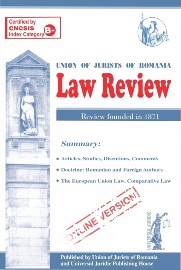THE RELATIONSHIP BETWEEN CONSTITUENT POWER AND NATIONAL SOVEREIGNTY SOME THEORETICAL CONSIDERATIONS
THE RELATIONSHIP BETWEEN CONSTITUENT POWER AND NATIONAL SOVEREIGNTY SOME THEORETICAL CONSIDERATIONS
Author(s): Andreea Ana-Maria AlexeSubject(s): Law, Constitution, Jurisprudence, Constitutional Law, Civil Law, Government/Political systems
Published by: Universul Juridic
Keywords: constituent power; popular sovereignty; modern democracy; self-legislation; basic democratic value of self-government; the people;
Summary/Abstract: Constituent power is the base of modern democracy, for two main reasons, a historical and analytical one. First, the birth of the modern doctrine of popular sovereignty coincides with the conceptual advent of constituent power. From a historical point of view then, constituent power and modern democracy are intrinsically associated from their beginnings in the idiom of popular sovereignty. Secondly, there is a profound systematic and conceptual analogy between constituent power and democracy, insofar as they both describe collective acts of self-legislation and public events of self-alteration. From this elective affinity, democratic constituent politics evokes the principle of liberty as political autonomy, whereby the members of a collectivity deliberately constitute the political forms of authority in order to organize and institutionalize their common life. The addressees of the law become its authors. Hence, formulating popular sovereignty as constituent power is to affirm the basic democratic value of self-government.
Journal: Law Review
- Issue Year: 2015
- Issue No: 01
- Page Range: 4-12
- Page Count: 9
- Language: English
- Content File-PDF

